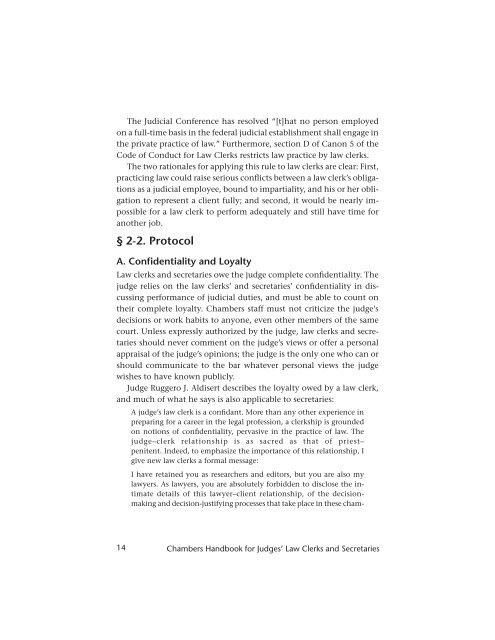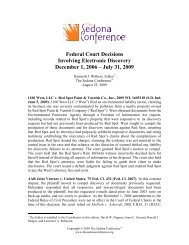Chambers Handbook for Judges - Federal Judicial Center
Chambers Handbook for Judges - Federal Judicial Center
Chambers Handbook for Judges - Federal Judicial Center
You also want an ePaper? Increase the reach of your titles
YUMPU automatically turns print PDFs into web optimized ePapers that Google loves.
The <strong>Judicial</strong> Conference has resolved “[t]hat no person employed<br />
on a full-time basis in the federal judicial establishment shall engage in<br />
the private practice of law.” Furthermore, section D of Canon 5 of the<br />
Code of Conduct <strong>for</strong> Law Clerks restricts law practice by law clerks.<br />
The two rationales <strong>for</strong> applying this rule to law clerks are clear: First,<br />
practicing law could raise serious conflicts between a law clerk’s obligations<br />
as a judicial employee, bound to impartiality, and his or her obligation<br />
to represent a client fully; and second, it would be nearly impossible<br />
<strong>for</strong> a law clerk to per<strong>for</strong>m adequately and still have time <strong>for</strong><br />
another job.<br />
§ 2-2. Protocol<br />
A. Confidentiality and Loyalty<br />
Law clerks and secretaries owe the judge complete confidentiality. The<br />
judge relies on the law clerks’ and secretaries’ confidentiality in discussing<br />
per<strong>for</strong>mance of judicial duties, and must be able to count on<br />
their complete loyalty. <strong>Chambers</strong> staff must not criticize the judge’s<br />
decisions or work habits to anyone, even other members of the same<br />
court. Unless expressly authorized by the judge, law clerks and secretaries<br />
should never comment on the judge’s views or offer a personal<br />
appraisal of the judge’s opinions; the judge is the only one who can or<br />
should communicate to the bar whatever personal views the judge<br />
wishes to have known publicly.<br />
Judge Ruggero J. Aldisert describes the loyalty owed by a law clerk,<br />
and much of what he says is also applicable to secretaries:<br />
A judge’s law clerk is a confidant. More than any other experience in<br />
preparing <strong>for</strong> a career in the legal profession, a clerkship is grounded<br />
on notions of confidentiality, pervasive in the practice of law. The<br />
judge–clerk relationship is as sacred as that of priest–<br />
penitent. Indeed, to emphasize the importance of this relationship, I<br />
give new law clerks a <strong>for</strong>mal message:<br />
I have retained you as researchers and editors, but you are also my<br />
lawyers. As lawyers, you are absolutely <strong>for</strong>bidden to disclose the intimate<br />
details of this lawyer–client relationship, of the decisionmaking<br />
and decision-justifying processes that take place in these cham-<br />
14 <strong>Chambers</strong> <strong>Handbook</strong> <strong>for</strong> <strong>Judges</strong>’ Law Clerks and Secretaries

















